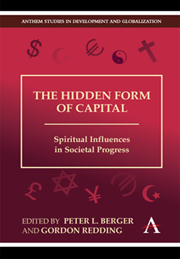Book contents
- Frontmatter
- Contents
- Contributors
- Preface
- Chapter 1 Introduction: Spiritual, Social, Human, and Financial Capital
- Chapter 2 Do Some Religions Do Better than Others?
- Chapter 3 Spiritual Capital and Economic Development: An Overview
- Chapter 4 The Possibilities and Limitations of Spiritual Capital in Chinese Societies
- Chapter 5 How Evangelicanism – Including Pentecostalism – Helps the Poor: The Role of Spiritual Capital
- Chapter 6 Flying under South Africa's Radar: The Growth and Impact of Pentecostals in a Developing Country
- Chapter 7 Importing Spiritual Capital: East-West Encounters and Capitalist Cultures in Eastern Europe After 1989
- Chapter 8 Orthodox Spiritual Capital and Russian Reform
- Chapter 9 Islam and Spiritual Capital: An Indonesian Case Study
- Chapter 10 Separating Religious Content from Religious Practice: Loose and Tight Institutions and their Relevance in Economic Evolution
Chapter 10 - Separating Religious Content from Religious Practice: Loose and Tight Institutions and their Relevance in Economic Evolution
Published online by Cambridge University Press: 05 March 2012
- Frontmatter
- Contents
- Contributors
- Preface
- Chapter 1 Introduction: Spiritual, Social, Human, and Financial Capital
- Chapter 2 Do Some Religions Do Better than Others?
- Chapter 3 Spiritual Capital and Economic Development: An Overview
- Chapter 4 The Possibilities and Limitations of Spiritual Capital in Chinese Societies
- Chapter 5 How Evangelicanism – Including Pentecostalism – Helps the Poor: The Role of Spiritual Capital
- Chapter 6 Flying under South Africa's Radar: The Growth and Impact of Pentecostals in a Developing Country
- Chapter 7 Importing Spiritual Capital: East-West Encounters and Capitalist Cultures in Eastern Europe After 1989
- Chapter 8 Orthodox Spiritual Capital and Russian Reform
- Chapter 9 Islam and Spiritual Capital: An Indonesian Case Study
- Chapter 10 Separating Religious Content from Religious Practice: Loose and Tight Institutions and their Relevance in Economic Evolution
Summary
Recent studies have revived an ancient debate and pointed to some form of correlation between the religious base of a society's culture and the state of its progress towards wealth. Some accounts have been highly controversial, and in particular those in the ‘clash of civilizations’ debate led by Huntington1. Others have been more literally ‘measured’, as for instance the work of the World Values Survey led by Inglehart, studies of ‘social axioms’ by Bond and Leung and the earlier chapter in this book by Harrison on the roots of progress. Others such as Sen have argued forcefully against the stereotyping that hides inside it an unstated assumption that religion per se is a direct cause of a society's main features. All accounts remain in the shadow of the sophisticated and extensive treatment of the question by Weber, often represented too simply by later scholars.
In this concluding paper I wish to explore an aspect of the issue that seems rarely addressed in discussions of economic progress, and that is the way in which societies vary in the degree of religious penetration of the societal fabric. My intent is to shift the focus of attention away from the content of religion, and to place it instead on the amount of societal ‘space’ a religion occupies. My working assumption is that if a society contains free space in which individuals are required to, and are at liberty to, invent order themselves if they want conduct regularized, then along with other factors, that context is conducive to the emergence of an institutional fabric appropriate to economic progress.
- Type
- Chapter
- Information
- The Hidden Form of CapitalSpiritual Influences in Societal Progress, pp. 213 - 230Publisher: Anthem PressPrint publication year: 2010



